-
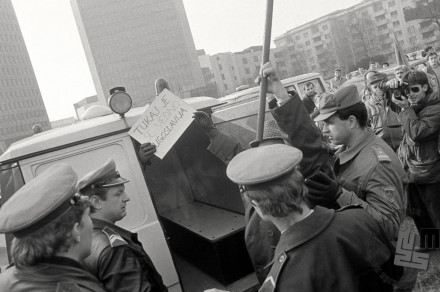
December 2019
30th Anniversary of a Decisive NO to the Rally of Truth in Ljubljana
This year marks the 30th anniversary of the stopping of the "rally of truth" in Ljubljana. The rally was planned to take place on December 1, 1989 and was organized by the Committee of the Association for the Return of Serbs and Montenegrins to Kosovo - Božur. It was officially announced on November 6 and on November 20 it was prohibited based on the decision made by the City Secretariat of the Interior. Since despite the prohibition the rally organizers insisted on coming to Slovenia - according to some estimations approximately fifty to sixty thousand people were to participate - Slovenia was forced to take special measures.
-
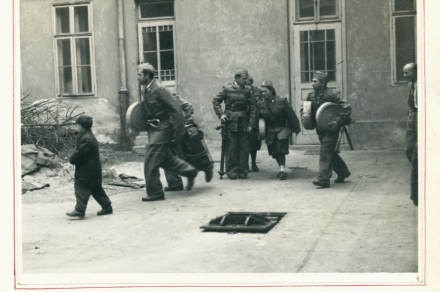
November 2019
Competition Report Issued by the Trade Union Branch Office of the Hotel Union in Ljubljana for the Second Half of the Year 1951
While during the early post-war years the Yugoslav trade unions were actively involved in rebuilding the demolished state and assisting people devastated by the war, as well as helping workers complete their planned tasks later on, the implementation of self-management limited their activities. From then on their primary purpose was to provide rewards for workers and help employees hold their elections or organize their work. Their educational role took central stage and this new direction of thought can clearly be seen also in the here presented report of the union branch office, which operated in the old and respectable crown jewel of Slovenian hotel industry – the Hotel Union in Ljubljana.
-
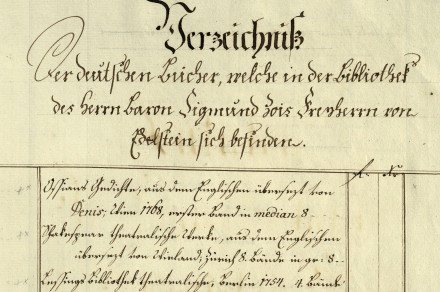
October 2019
Catalogue of the Books Owned by Žiga Zois
This year marks the 200th anniversary of the death of Žiga Zois, a member of the Enlightenment movement, patron of arts and literature, natural scientist and economist. Two of the most important collections kept by Žiga Zois at his house in the Breg in Ljubljana were his collection of minerals and his library, which at the time was one of the richest and largest private libraries within a wider Slovenian territory. His library holdings were catalogued several times, and occasionally he compiled such catalogues himself. Some of the lists of his books are today kept also by the Archives of the Republic of Slovenia.
-
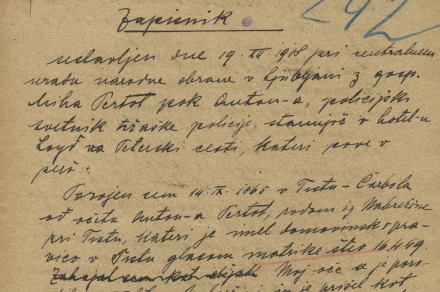
September 2019
Italian Military Authority in the Occupied Slovenian Territory after the End of World War I
The transition under Italian military authority in the occupied territory west of the demarcation line can be studied through numerous reports of the local population, officials, politicians and other reporters, who addressed their correspondence to the National Government for Slovenia, the National Council or to the Office for the Occupied Territory in Ljubljana. The problems faced by officials, teachers and other members of Yugoslav intelligentsia in the occupied territory are well illustrated by the minutes no. 242 of December 1918.
-
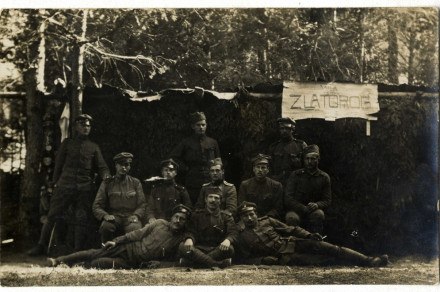
August 2019
Retreat of the Yugoslav Troops South of the Demarcation Line which Divided Carinthia into Plebiscite Zone A and Zone B since July 1919
On June 21, 1919, after long and painful negotiations, the Supreme Council of the Paris Peace Conference decided that the Carinthian issue was to be solved by means of a plebiscite conducted in two zones. Zone A was to be until plebiscite occupied and managed by the Kingdom of Serbs, Croats and Slovenians, and Zone B was to be managed by German Austria. In accordance with this agreement, Yugoslav military troops had to retreat behind the demarcation line.
-
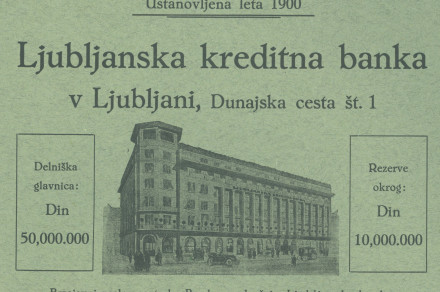
July 2019
Time Mirrored in the Minutes of the Ljubljana Credit Bank Authorities
Protocols on the plenary sessions of the Ljubljana Credit Bank management board for the period between 1926 and 1932 contain caligraphically recorded discussions, reflections and findings of the members of the management board of the first "truly Slovenian" bank. Unlike printed annual reports, which were stuffed with numbers, these records reveal a more personal and direct testimonies and witnessing of the events. Reading them can easily take us 90 years back. We find out, for example, that the management of the bank at the start of 1930 was more worried about "abnormal weather" of the past year than about the American stock market crash.
-
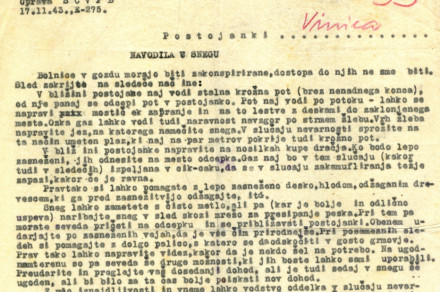
June 2019
Slovenian Central War Partisan Hospital and Measures to Ensure its Secrecy
Keeping partisan hospitals well hidden and their operations secret was essential, and not many people knew about their existence or location. Hospitals were ideally constructed on sparsely populated Karst terrain, in naturally formed ditches, the forest needed to be coniferous and overgrown, and any tracks needed to be carefully covered. Camouflaging entrances into such hospitals was of utmost importance. The unwritten rule of partisan hospitals was that there can never be too much secrecy.
-
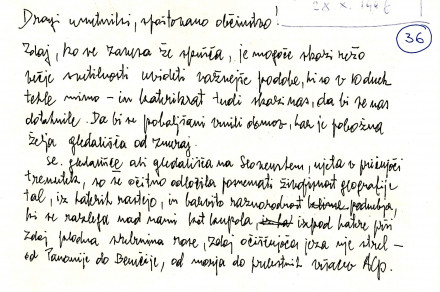
May 2019
Speech Delivered by Rudi Šeligo at the 1996 Boršnik Meeting
This month's archivalia is a speech delivered by Rudi Šeligo at the Boršnik Meeting in Maribor in October 1996. The document is kept among Šeligo's private archival records that were transferred to the Archives of RS in 2005. If we pay close attention to the text we can see that not much has changed in Slovenian culture within the last almost 25 years. The same speech could easily be delivered today; sadly, it would still be equally relevant.
-
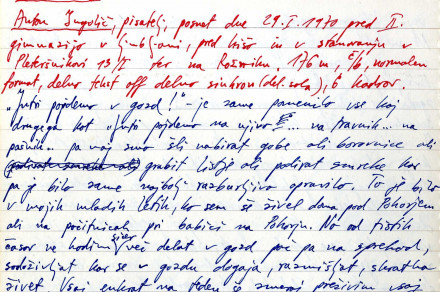
April 2019
Archival Film Shootings of Viba Film 1967-1975
Archival records of the late director Milan Ljubić, which were transferred into the Archives of the Republic of Slovenia in 2018, contains a lot of material that refers to the realisation of the so-called “Chronicles". These are archival film shootings of individual Slovenian workers, important for their role in cultural and public life of that time. Also preserved are separate notes of Milan Ljubić, who was the organizing producer of Chronicles between 1969 and 1975.
-
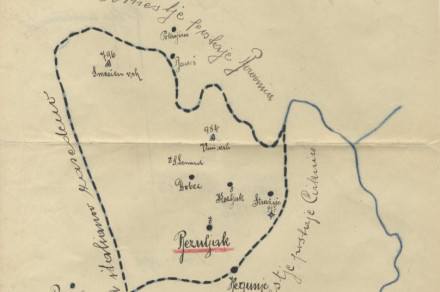
March 2019
»... Seven Eggs for Two Kilos of Rice and a Quarter of a Kilo of Coffee …«
Demarcation line and later state (Rapallo) border between Italy and the new Yugoslav state cut through areas, municipalities and villages that once belonged to the same state. Many people who lived near the border found themselves separated from their forests, meadows or fields which remained on the other side of the border. Special passes were needed for people who owned real estates in both of the neighbouring states, as well as for those who made daily trips to help out on the farms. Massive daily crossing of the border led to thriving trade of smuggling and contraband. Although officially there is no distinction between the two terms, they were, however, perceived differently by the people.
-
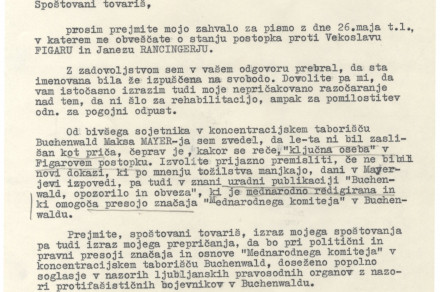
February 2019
A Letter by the Czechoslovakian Minister of Justice Dr. Neuman to the Federal Secretary of Justice of the Socialist Federal Republic of Yugoslavia Regarding the Rehabilitation of Vekoslav Figar and Ivan Ranzinger
This month’s archivalia is a letter sent by the Czechoslovakian Ministry of Justice Dr. Alois Neuman to the Federal Secretary of Justice of SFRJ Milorad Zorič on August 6, 1966. The letter makes it evident that the Czechoslovakian minister had been monitoring the situation of the two men convicted at the eight Dachau trials for quite some time. He expressed his deep disappointment over the fact that the two men were merely pardoned and released from prison, and not fully rehabilitated.
-
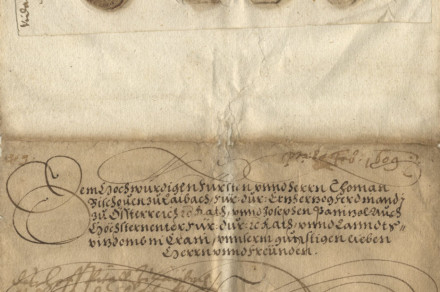
January 2019
Request of the Inner Austrian Court Chamber Addressed to the Superintendents of the Emperor’s Court Hospital in Ljubljana, Asking for the Report on the Hospital’s Debt
The request made by the Inner Austrian Court Chamber on behalf of the territorial prince Ferdinand II in 1609 and sent to the Ljubljana bishop Tomaž Hren and to the Carniolan Vicedom Jožef Panitzol, is a small, but valuable piece in the mosaic of diverse archival notes on this provincial-princely institution. It is a source that confirms the fact that the authorities in Graz (and later in Vienna) cared about the financial conditions of the court hospital – which, apart from the town hospital, was the only long-lasting health care institution in Ljubljana during the early Modern Times.


![Elevation of the Lords of Sanneck (Žovnek) to comital status and their receiving of the title of the Counts of Celje [München, 1341].](/assets/organi-v-sestavi/Arhiv-RS/Slike-za-izpostavitve/Obdelava-arhivskega-gradiva-2__FitWzk4MCw5ODAsIjM5NzViZTY4MGEiXQ.jpg)











